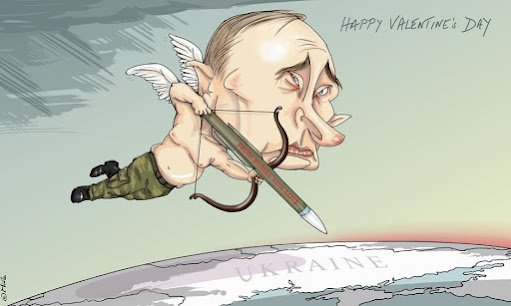Why Putin Won't Be Invading Ukraine
Are we trembling on the verge of war? Is President Putin, his army arrayed around the borders of Ukraine, about to invade? The West seems to think so. Though the diplomacy continues, the embassies are being emptied, and foreign nationals urged to leave the country. It all seems very ominous, and despite the best efforts of European leaders to find a compromise, we are being told there is a "whiff of Munich in the air." Now Vladimir Putin may not be a very nice man. The regime he presides over may be authoritarian and brutal. But he is not stupid, and he must be very well aware that invading Ukraine would not be a smart move.
Though the superior firepower of the Russian army would undoubtedly allow him to take Kiev within days, his troubles would only just be starting. Even aside from the sanctions that the West would impose (limited in scope and effect though they would inevitably be), Russia would be drawn into a long and bloody guerrilla war with no end in sight, cement its reputation as an international pariah, and probably send its struggling economy into a nosedive – not to mention the risk of escalating the conflict into something far worse. It doesn’t make much sense, and neither does that fact that with each passing day the initiative is lost: the essence of military success is to attack when it is least expected, not when your enemy is fully prepared.
So what’s Putin’s game? In fact, it’s not so hard to discern. Top of the laundry list of demands he has put to NATO is that they agree that Ukraine should not become a NATO member state. That’s not entirely unreasonable: with fourteen former Eastern bloc countries having already joined NATO since 1997, he can be forgiven for thinking that the West have their tanks parked on his lawn. Not to mention the fact that since the Trump administration withdrew from the 1987 Intermediate-Range Nuclear Forces treaty with Russia in 2019, there is nothing now to stop the US putting nuclear missiles right in Russia’s backyard. It really is like Cuba in reverse.
Russia has been complaining about this for years. Many years. But NATO has been intransigent, telling Putin that the expansion of NATO is not his business. But if the boot were on the other foot, as it was in 1962, the West would be equally alarmed. So seen from the Russian side, the refusal to talk – let alone negotiate – is a real problem. In part then, the threat posed by a build-up of troops is a means of forcing the West to come to the table – and to that extent, it has already been a success. But even if the US and NATO refuse to concede any ground, there is another hidden benefit: one of the conditions of a country joining NATO is that they must not be involved in any “unresolved territorial disputes”. And with a large well-armed army close to Ukraine’s border, that becomes an ongoing and irresolvable issue.
So that seems the most likely rationale for what’s going on. An invasion would be a disaster for all involved, Russia most of all. But there’s another reason why Putin probably won’t. Though not much talked about in the Western media, recent anti-war statements issued by both the Russian Congress of Intellectuals and the All-Russian Officers' Assembly indicate that some kind of shift is going on within Russia. The fact that so many people are prepared to publicly oppose Putin seems to mean they feel his power is on the wane, and that he is losing popular support. If true, that’s not so surprising: the castle usually falls from within, and he won't want to encourage that. It is the 21st century after all. In our interconnected, joined-up world, what’s really surprising is that he and his ilk have lasted so long.




Comments
Post a Comment